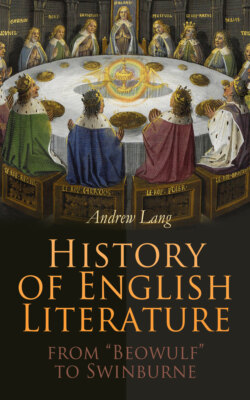Читать книгу History of English Literature from "Beowulf" to Swinburne - Andrew Lang, Robert Kirk - Страница 24
На сайте Литреса книга снята с продажи.
Bede.
ОглавлениеWhen we think of the time in which Bede, the greatest of our early scholars, lived and worked, it seems amazing that he had such a wide knowledge of books and so comparatively clear an idea of the way in which history should be written. Born in 673 (died 735), he was in his thirteenth year when his king, Egfrid of Northumbria, was killed by the Piets (practically Gaelic-speaking Highlanders), in the great battle of Nectan's mere (685), in Angus beyond the Tay, for so far into what is now Scotland had English Northumbria pushed her conquests. Great part of these was lost, and in the eighth century, there came an age of anarchy and civil war, as fierce as the contests of the old times of heathendom. To us the Anglo-Saxons of these ages seem barbarous enough, but Bede speaks of the Piets of Scotland as "barbarians". He constantly deplores the greed and ignorance of the clergy, in terms much like those used by the Protestants before the Reformation. In an ignorant age Bede wrote unceasingly and copiously about such natural science as was within his reach, especially using that popular and fanciful book of Pliny, mere fairy-tales of natural (or unnatural) history. He wrote much and usefully on chronology in relation to history; and on theology, of course, he wrote abundantly. Most important is his "Church History of the Race of Angles," without which we should know little indeed concerning the Anglo-Saxon invasions of Britain, and the development of events both in England and Scotland. His tale of the reception of Christianity by Edwin is very commonly quoted: it is of much literary interest, and proves that the sense of the mystery and melancholy of the world, so often expressed in Anglo-Saxon poetry, weighed heavily on men who were not poets.
A council or Witanagemot was held to consider the Christian doctrines preached by Paulinus. One noble, Coifi, said, in jest or earnest, that the heathen religion was useless, "for no man among your people does more to please our gods than I, but many are more favoured by you and by fortune". Coifi, therefore, voted that Christianity deserved consideration. But another noble, agreeing so far, added, "Human life, oh King,... seems to me to resemble the flight of a sparrow, which flits into your warm hall at a feast in winter weather. The bird flies into the bright hall by one door, and out by another, and after a moment of quiet, slips from the wintry darkness into the wintry darkness again. Such is the life of man, that is for a moment, but what went before, and what comes after, as yet we know not." The practical Coifi then proposed to destroy the old temples of the old gods; rode off, and threw his spear into a shrine.
Coifi's idea was merely to "change the luck," and to enjoy the pleasures of destruction; he was of a common type of reformers; while the other speaker desired intellectual satisfaction, and the understanding of the mystery of existence.
Latin and even Greek learning, we have seen, found footing in southern England with the arrival of Archbishop Theodore and Abbot Hadrian at Canterbury in 669. Latin had never been quite extinct. A non-English writer in Latin, in Scotland, is Adamnan (died 704), author of a Life of the Irish St. Columba, who brought Christianity to the Picts of Scotland, while later from his little holy Isle of Iona missionaries reached Northumbria. Adamnan's book may be read with more pleasure than any other of the time; it is so rich in pictures of Highland life and sport on sea and land, and in tales of magic and the second sight. This was one of the works used by Bede in writing his "History".
The numerous books which were within the reach of Bede were brought, in five journeys, by Benedict Biscop, Abbot of Wearmouth, from Rome to Northumberland. Before Bede, such books had been studied by Aldhelm (Bishop of Sherborne, died 709). He wrote poetry in the native language, which King Alfred greatly admired, but none of the extant poems are attributed to him. His Latin would have surprised Cicero; he delighted in strange words, and in strings of alliterations. He wrote edifying treatises on Christian virtues as exemplified by Biblical characters and by saints, some of them rather fabulous personages. He knew many early Christian authors, and Virgil, Cicero, Ovid, and Lucan, but his own style was as absurdly bombastic as that of many of the ancient Irish romances. He had disciples in style, who manufactured acrostics in Latin verse.
The Latin literature of the southern Anglo-Saxons thus fell for a time into full decadence; very different was the learning of the northern Bede. His taste was uncorrupted by the sudden arrival of ancient literature among a people almost barbarous. He wrote in plain Latin without affectation concerning things worthy to be known and remembered: he gave us a frank and charming picture of the great St. Cuthbert; he had, no doubt, too great a love of miracles, and rather exaggerated some which he found in earlier lives of early English saints, such as the said Cuthbert, the saint of the Border, whose body sleeps in Durham Cathedral. The authors whom he quotes are mainly Christian, including many of the chief Fathers of the Church, and he is not certain about the propriety of studying the heathen classics, though he cannot abstain from Virgil, who, it was fancied, predicted the coming of Christ. He had Greek enough to read the Greek New Testament, but this learning was lost, in England, in later times. The translation of Bede's "History" into Anglo-Saxon under King Alfred was not the least of his gifts to his people.
